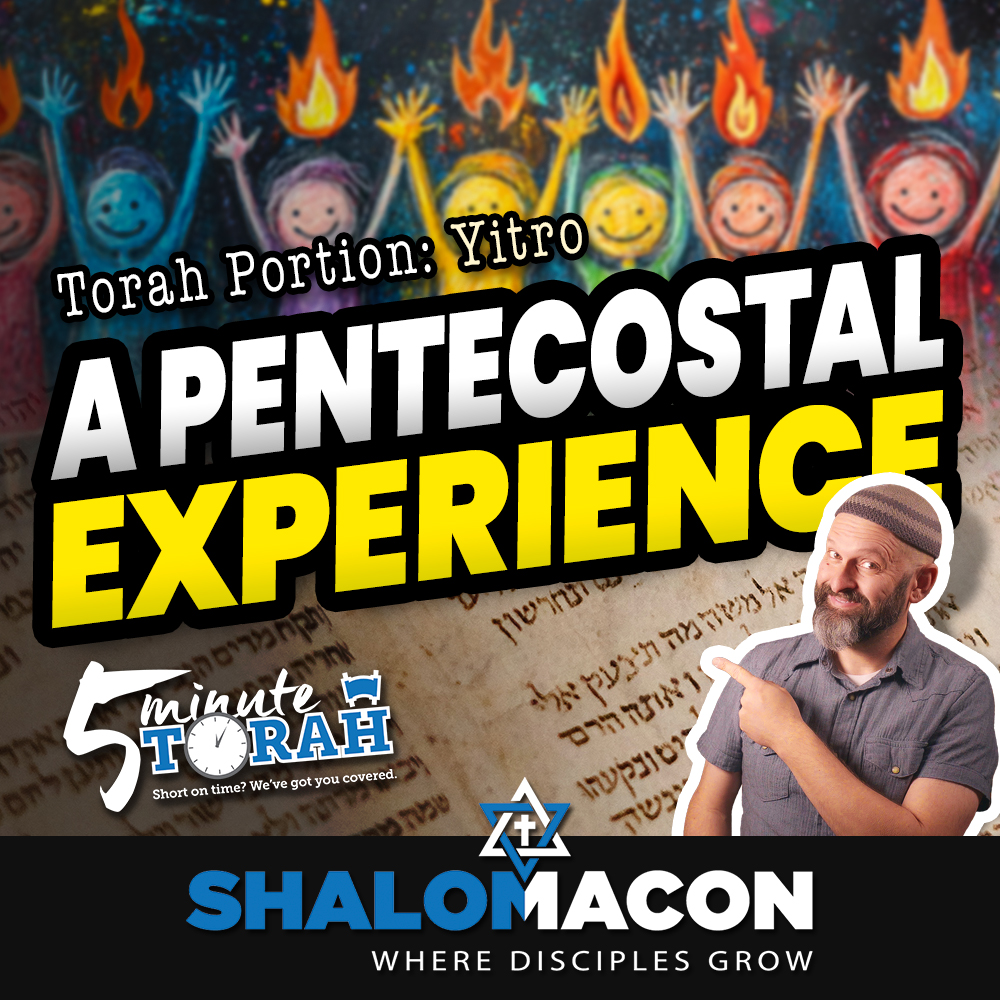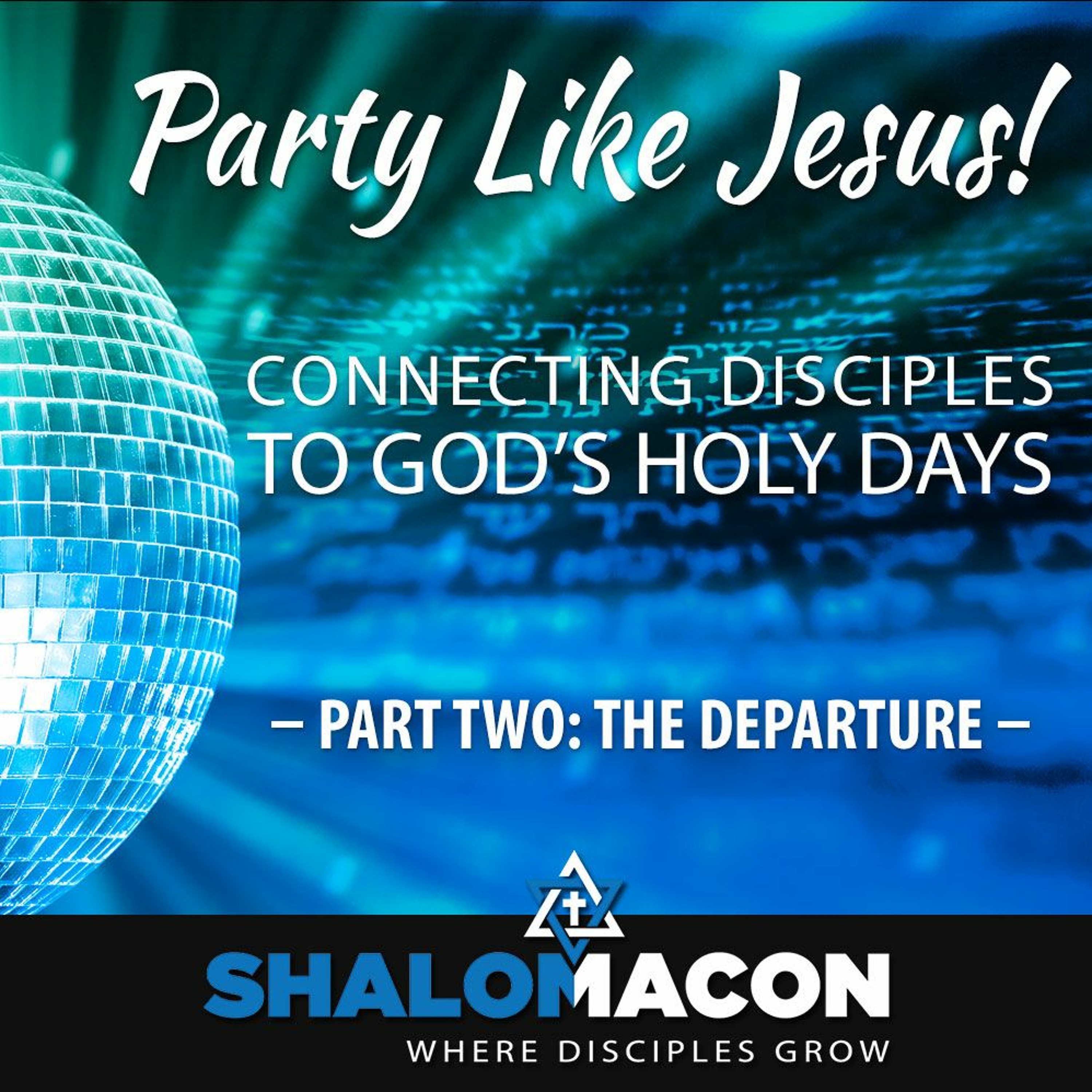Episode Transcript
[00:00:00] Speaker A: In Acts chapter two, we read about the followers of Yeshua coming together on the Temple Mount on the day of Pentecost. When they were gathered together, God poured out his spirit on them in a powerful way. They heard the sound of a mighty rushing wind and what appeared to be tongues of fire were resting above their heads. And then all the Jews who had traveled from across the world for the festival heard them speak, speaking of the wonders of God in their own native language. It was an incredible experience that empowered the disciples and confirmed their mission. But was this a unique experience? Or did something like this happen once before? Was God using this experience to turn them away from following Judaism and start a new religion based on a new religious experience? Or was there something deeper going on that connected them back to God's promises made thousands of years beforehand? Let's find out together in this week's five Minute Torah Shalom and Blessings from Shalom Macon, the place where disciples of Yeshua learn, connect and grow. I'm Darren and before I get into the five minutes of my five minute Torah commentary, let's cover a few quick facts about this week's Torah portion. This week we are studying the portion of Yitro Exodus 18:1, 2023 and here are the three things that you need to know about it. Number one the wisdom of Jethro and the Proto Sanhedrin. At some point during the showdown between Moses and Pharaoh, Jethro had come and taken Moses wife and children back to Midian with him. Once the children of Israel had been released, Jethro meets Moses in the wilderness with his wife and children. But when he sees everyone standing all day waiting their turn for Moses to make a ruling or judge their civil and religious cases, Jethro tells his son in law that he's not only going to wear himself out, but he's going to wear out the Israelites as well. So he proposes that Moses set up a chain of command. There would be those who would be judges over thousands and hundreds and fifties and tens. And if any case was too difficult for them, it was to be brought before Moses himself. Jethro describes the type of men he is to choose as capable men for from among the people men who fear God, who are trustworthy and hate a bribe. This is Exodus 18:21. Moses takes his father in law's advice and establishes a system of leadership and justice in Israel, freeing up Moses to do all that God required of him, setting the stage for the future of Sanhedrin that would eventually be the Supreme Court of Israel. Number two. Har Sinai, up on the mountain. Coming into the presence of the God of the universe is a big deal. When God summoned Moses to the mountain, he was serious. He gave specific instructions as to how the Israelites were to treat the experience with the proper sanctity. Go to the people and consecrate them today and tomorrow and let them wash their garments and be ready for the third day. For on the third day the Lord will come down on Mount Sinai in the sight of all the people, and you shall set limits for the people all around, saying, take care not to go up into the mountain or touch the edge of it. Whoever touches the mountain shall be put to death. No hand shall touch him, but he shall be stoned or shot. Whether beast or man, he shall not live. This is Exodus 19, verses 10 through 13. We can see from this that coming into the Lord's presence is a bit like playing with fire. Get careless and you will undoubtedly get burnt. If only we had that kind of healthy respect for the omnipotent Creator today. And number three, Aseret Hadvarin, the biggest 10. The whole reason God brought Israel to the mountain was so that he could enter into a marriage covenant with him. He was the husband and they were his bride, with the Torah as the marriage contract. The Torah wasn't given to be a legalistic set of rules that oppress the children of Israel. God had just delivered them from slavery. Why would he want to turn it right back around on them? No, the Torah was given for a purpose. Our Torah portion says, now, therefore, if you will indeed obey my voice and keep my covenant, you shall be my treasured possession among all peoples, for all the earth is mine, and you shall be to me a kingdom of priests and a holy nation.
God's plan for Israel was that they would stand out from among all the other nations of the earth as a nation that is holy and set apart for a service. The Ashret Hadavrim, literally the ten words, or what we call the Ten Commandments, are the famous face of the Torah's commandments. But There are another 603 waiting to be discovered in our Torah studies.
[00:04:46] Speaker B: Are you ready to take your Passover Seder to the next level? Do you want to have a meaningful connection to Yeshua during Passover? Then grab a copy of cup of Redemption, my Messianic Passover Haggadah, and crank it up a notch. It not only walks you through the traditional Seder, but it also connects Yeshua's last meal and his suffering with the various elements of the Seder. It's great for homes and Messianic synagogues as well as churches, and gives step by step instructions for conducting your own seder. It also includes an appendix with articles that answer many questions and objections people might have about a traditional Seder like why do we have an egg on the seder plate? And what's considered leavening and is priced low enough to snag a copy for everyone at your seder table. Just use the link in the description box below to gear up early so you can be ready to make this.
[00:05:24] Speaker A: Passover your best Passover this week's Torah commentary is called A Pentecostal Experience and comes from my book 5 Minute Torah, Volume 3. We are all familiar with what took place in Acts chapter 2 after Yeshua's resurrection. He instructed his disciples to remain in Jerusalem so they would be filled with the Ruach Hakodesh, the Holy Spirit. Here's the account of how it happened. When the day of Pentecost arrived, they were all together in one place and suddenly there came from heaven a sound like a mighty rushing wind and it filled the entire house where they were sitting and divided tongues as a fire appeared to them and rested on each one of them. And they were all filled with the Holy Spirit and began to speak in other tongues as the Spirit gave them utterance. This is Acts 2:1:4. Yeshua's disciples encountered the Spirit of the Lord in a powerful way that not only transformed their lives, but also empowered them to boldly proclaim the good news of Yeshua's coming kingdom. But what does this event that happened during the lives of the Apostles have to do with our current Torah portion? The Torah portion of Gitro records for us the giving of the Torah on Mount Sinai, particularly the big 10 of the 613 commandments. It tells us how God revealed Himself to an entire nation at once. Now, when all the people saw the thunder and the flashes of lightning and the sound of the trumpet and the mountain smoking, the people were afraid and trembled and and they stood far off. This is Exodus 20:15 or verse 18 in a Christian publicized Bible. This passage has a problem, however, that almost every commentator addresses. We are told that the people saw the thunder and the flashes of lightning. It's normal to hear thunder, but not normal to see thunder. And to compound the problem even further, the Hebrew doesn't use the normal word for thunder. It uses hakalot, which means literally the voices. Literally, these people saw the voices. How do you see voices and what voices are we talking about? The Midrash understands this to mean that the voice of God came from the top of the fiery mountain and went out to all the nations in all of the known languages of the world. Rabbi Yohanan said the voice would go out and divide into 70 voices for the 70 languages, so that all the nations would hear and each and every nation would hear in the language of the nation, and their souls would depart. But Israel would hear and they were not injured. This is From Midrash Shemote 5, 9. Jewish tradition places this event at the festival of Shavuot, also known by its Greek name. You got it. Pentecost. God gave his Torah at Pentecost, and his voice went from forth in all the known languages of the world to proclaim his kingship on earth. Essentially, this is what happened in the Book of Acts as well. The apostles would have associated this experience with the original Shavuot, confirming that God was doing something related to what he did the first time. When all of Israel had gathered in Jerusalem to celebrate Shavuot or Pentecost, something incredible happened. God once again revealed Himself in a powerful way, just like at the very first Pentecost. This time, however, it was in a way that transformed the hearts of Yeshua's disciples and enabled them to live out the Torah's precepts from the inside out. The Spirit began the work of renewing their hearts in fulfillment of the prophecies of both Jeremiah 31 and Ezekiel 36, and gave them supernatural strength to share the good news of the kingdom with all, all those who would hear. At the first Shavuot, the children of Israel guarded and protected the message at the Shavuot. In Acts, the Lord used them to send his message forth into all the world. At the first Shavuot, God's voice went out in every language, but only the children of Israel heard it and responded. At the Shavuot in Acts, the Lord's voice went out into every language, but this time it came from the mouth of the children of Israel and and people from every nation responded. When most people speak of Pentecost and the Pentecostal experience, the focus is on the gift of speaking in a language unknown to them. For the apostles, however, the experience was completely about transmitting Yeshua's kingdom message to people they would otherwise not be able to communicate with. What good is a gift if it's never used for its purpose? The apostles realized that their experience was for a higher purpose and utilize it to accomplish the will of God and bring untold thousands into the kingdom. We've all had spiritual experiences that have transformed us in some manner, how can you better use your spiritual experiences to accomplish God's will in your life and in others? If you enjoyed relearning what you always thought you knew, then you'll definitely enjoy my five minute tour called Holy Ham and Cheese. Discussing Peter's dream in Acts, chapter 10. Just check it out right here.



